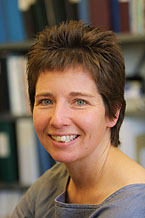Chemistry professor awarded research grants totaling $210,000
Rachel Narehood Austin, a member of the chemistry faculty at Bates, has received two grants totaling $210,000 to support her research into the oxidation of hydrocarbons in the environment.
Austin was awarded a $60,000 Henry Dreyfus Teacher-Scholar Award from the Camille and Henry Dreyfus Foundation in December. This month, she received an academic research enhancement award of $150,000 from the National Institute of General Medical Sciences, one of the National Institutes of Health.
Austin is investigating the molecular mechanisms through which hydrocarbons, a category of compounds that includes fossil fuels, combine with oxygen. Hydrocarbons occur in the environment both naturally and as the result of human activity. Burning is an obvious means of oxiding such compounds, but Austin is concerned with more controlled and precise reactions, such as those performed by certain bacteria.
“There’s a longstanding interest in figuring out ways of using molecular oxygen to selectively oxidize hydrocarbons,” says Austin. “Nature can do it, but chemists really struggle to accomplish it. Our detailed studies of the enzymes that nature uses may provide insight into how to design synthetic systems to do the same kind of chemistry.”
The grants will defray the costs of travel to other research facilities, supplies and compensation for Austin’s partners in research, including Bates students and a two-year post-doctoral fellow. Also, the Bates chemistry department will receive $5,000 of the Dreyfus grant to support undergraduate research.
Austin is focusing on a type of bacterial enzyme, the so-called diiron enzyme, involved in hydrocarbon oxidation. “I’ve done all I can with studying the enzyme in whole cells,” she says. “To answer my remaining questions, I have to purify the enzyme, at least partially.”
Such purification “is notoriously difficult,” she says. “But I’m convinced it’s an important problem to tackle.”
Understanding the natural transformation of hydrocarbons, Austin explains, “might be useful for people interested in speeding up the natural transformation of hydrocarbons — as in bioremediation — or for people interested in how natural processes may change as climate and other environmental factors change.”
She adds, “I hope that I can serve as an example to other chemists to show how rewarding it is to work on complex environmental problems.”
Austin teaches inorganic chemistry and general chemistry and is a member of the Bates environmental studies program. She came to Bates in 1995 after completing a Ph.D. at the University of North Carolina at Chapel Hill. She received a B.A. in chemistry and dance from the University of North Carolina at Greensboro in 1990.
Established in 1993, the Henry Dreyfus Teacher-Scholar Awards support and encourage young scholars who have demonstrated excellence in research and teaching, and significant achievements in scholarly research with undergraduates. Bates was one of nine institutions to receive a 2004 Henry Dreyfus Teacher-Scholar Program grant.
Austin is the second member of the Bates chemistry faculty to receive the Henry Dreyfus award. The first was professor T. Glen Lawson, in 1995. In addition, another member of the department, professor Thomas Wenzel, won a Dreyfus Foundation grant totaling $105,000 in 2003 to support a departmental teaching and research fellow.



